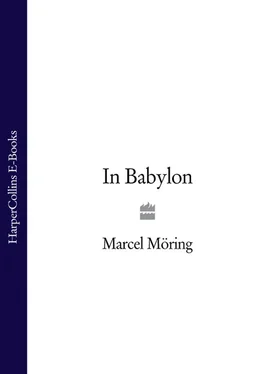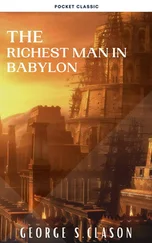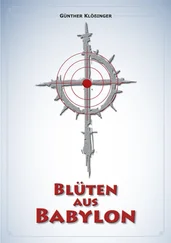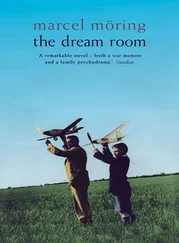‘In Japan?’
‘No, that wasn’t the first. In the desert, near Alamogordo, New Mexico.’
‘Okay,’ she said. ‘Supposing … no, I believe you, but … would you please begin at the beginning?’
‘The problem is, you never quite know where the beginning is, in this family …’
‘Somewhere,’ she said, louder now. ‘Begin somewhere, anywhere, and work your way forward. Chronologically. All this jumping back and forth is driving me mad.’
I drank my wine and tried to forget Tolstoy’s blueberries. Nina sat curled up in her chair, head bowed, the heavy red hair like a hood around her face and over her shoulders. I filled our glasses, we drained them. We smoked another cigarette. Outside, the wind grabbed hold of the shutters and ran its hands along the house looking for chinks, holes, some way to get in. It wailed and moaned like a restless spirit. Around us the darkness bowed over the glow of the flames and it was as if we were sitting in a cave: the storyteller and the last member of his tribe, waiting until the fire, and finally they, too, turned to ashes.
A Land of Milk and Butter
IT ALL BEGAN with Great-Great-Grand-Uncle Chaim Levi and his nephew Magnus. Uncle Chaim was a clockmaker, Magnus came walking all the way from Poland, his tool chest on his back, to build a new life for himself in the Lowlands. My great-grandfather, who was also a clockmaker, and my grandfather, the physicist, prided themselves on the fact that the men in our family, since the prehistory of clockwork, had all been people of time. Whenever my grandfather was holding forth and wanted to lend weight to his argument, he would bring up Magnus. Magnus Levi had learned the trade from Uncle Chaim, who had invented the pendulum clock, an innovation that made so little impression in seventeenth-century Lithuania that Uncle Chaim had flung it under his workbench, forgot about it, and was promptly forgotten himself. According to Uncle Herman, that pendulum clock was the first example of a familial talent to be in the wrong place at the wrong time.
Clockmakers, that’s what we were, even in the days when time was a rare commodity. Ragged tinkers who travelled from town to village and village to town, the clocks in a chest on their back, the little tools rolled up in canvas. Always on the road and always the tinkling of the bells of the wall clocks, the faint thrumming of the rods in the mantel clocks, the chickechickechick of the pocket watches. They carried time on their backs. Time travelled with them. Time was what they lived on. And for some, time was why they died. A distant ancestor once repaired a steeple clock, somewhere in the East, in a provincial capital on the edge of a Steppe. The clockwork had run riot and every few minutes you heard the sonorous chiming of the quarter hour or the rich blur of strokes that told the hour. The smith, at risk to his own life, had tried to disconnect the striking mechanism, but had got no further than muffling the sound with an old gunnysack. By the time the clockmaker arrived, he had nearly been beaten to a pulp. In the village, no one (except the deaf sexton) had slept for two days. Men, women, children, even animals had bags under their eyes and snarled and snapped at each other. Happy marriages threatened to dissolve, many women had fled to their relatives in other villages, the cows had stopped giving milk. There wasn’t a bird to be seen for miles around.
The clockmaker was received by a hoarse-voiced village elder. They shook hands, drank a glass of tea, and listened as the old man shouted out the details of what had happened. Then he plugged up his ears with wax and climbed the tower. The smith went with him. But when they reached the top, the clock would not be silenced. The two men climbed back down again, went to the village elder, and told him what was wrong. ‘We’ll just have to wait,’ the clockmaker said, ‘until the works have wound down.’ The village elder shook his head and said that wasn’t possible. Tomorrow was the annual fair and if the clock hadn’t stopped by then, the merchants would all go running. The village would lose such a large portion of their income that they wouldn’t be able to afford the sowing seed for the following year. The clockmaker looked at the smith, spread his arms, and climbed back up. There, between clock and clapper, he met his death.
Uncle Chaim was a taciturn man. He sat in his little wooden house, repaired timepieces, and shrugged his shoulders. ‘History,’ he told the young Magnus, ‘is like a clock. You think it’s getting later, but the hands are always moving in the same circle. What’s on top today, is on the bottom tomorrow.’ Magnus, who often came to see him in the little house at the edge of the woods and helped him out, or leafed through the old books that lay under the bed, Magnus would think back on what had happened, when a band of Cossacks had struck off the head of Chaim’s wife because she happened to be standing outside the door with a basket of washing when the horsemen thundered past. And he also thought of the village on the other side of the forest that, one day, was no longer there – burned to the ground.
Whenever Magnus was with his uncle, in the shaky wooden house, hidden among the trees at the edge of the forest, Chaim sat him down on the cracked bench beside the door and told him about the past, wading back and forth across the grey wooden floor, taking up clocks, picking up a screw here and there and putting it in one of the many drawers and boxes on the table under the window. Magnus sat down on the bench, which was so old it gleamed like dung, and listened. They drank tea out of glasses white with lime.
The old man told him of the days when there weren’t any Cossacks and everything was green and fields of sunflowers bloomed just outside the village, green stalks as thick as your arm with heads as big as wheels and in those heads the black spiral that nearly sucked you in, right into the heart of the sun … Magnus listened and thought: It’s all nostalgia, regret for lost time.
Great-Great-Grand-Uncle Chaim’s favourite story took place in the days when he was just a boy and lived in a town in the North, on the river harbour. His parents owned a modest house on the quay. At the end of the cart track that ran along the house, where the deep furrows branched off to the right and disappeared in the first hesitant overgrowth of the great forest, stood a small wooden structure that looked like a cowshed and was inhabited by a woodsman and his three daughters. Chaim spent nearly all his days in the woods behind that odd-looking house, where he and the eldest of the three girls would think up long, perilous adventures.
‘It wasn’t a very big forest,’ he said. ‘Maybe two days around, but when you’re ten years old you can wander about a forest like that for a week and think you’re in another country. We usually pretended we had to make a dangerous journey, on horseback, straight through the Carpathians, through the forests of Lithuania. Early in the morning I would come for Freide and we’d go to the kitchen and fill a knapsack with provisions: some bread and cheese, a bottle of water. Then we’d mount our horses, the ones we didn’t have – we were just pretending – and ride out. First a long way over the firebreak, but soon we were among the trees, where it was dark and quiet. Usually we wouldn’t be home until suppertime, when it started getting dark. I can’t remember us talking much. We rode and rode, and were especially careful when our horses had to go downhill. Such fun we had. But the best part about the forest was clearing the land.
‘At the end of the summer,’ said Chaim, ‘we’d all go into the forest. The woodsman, Freide and her sisters and I would spend the whole day gathering brushwood. We sawed down sick trees, cut back gnarled branches, cleared the paths … In the afternoon we ate in the open field, right next to the lane, and in the evening, when we were done, we brought our brushwood there and made a big fire. You mustn’t forget, it was getting colder by then. Late September. During the day the sun still shone brightly, but the evenings were cool. We wrapped ourselves in blankets and the woodsman and I built a campfire. First a pile of dry leaves, covered with twigs, then a sort of wigwam made of branches, and on top of that heavy, gnarled boughs, as thick as an arm and often still green. After a while we had a big cone of wood. We left a small opening at the bottom where we could stick in a dry, burning branch. The campfire began to burn from inside out, from little to big, from dry to wet. It usually wasn’t long before we had a huge fire, and we roasted potatoes in the ashes. Above us, and in the forest, it had gone completely dark and we sat in that clearing, lit by the flames. Shadows danced among the trees. The sparks from the fire flew up to the treetops and burst into pieces. We would sometimes feel a little scared. As we pricked our potatoes on sticks and held them in the ashes, the woodsman told us ghost stories. I wish you could have seen it.’
Читать дальше












